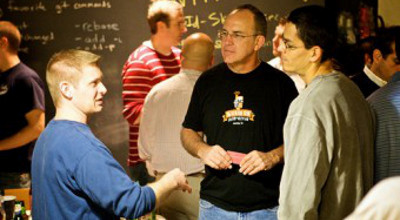
Editor's Note: As executive catalyst for the church-planting network Mission Orange County, Chris Lagerlof works with churches in 34 cities in Orange County, Calif., to collaborate for the good of their cities and to plant churches that have a city focus.
Here, Lagerlof reflects on more than 30 years of ministry experience to offer six practical principles any church leader can learn from as he focuses on making disciples in his context:
1. Don’t mistake participation for transformation. In Orange County, we get so excited about events and people showing up that we sometimes mistake big attendance for actual transformation. In church planting, a number of the models that have been embraced for the last 25 years are event-driven. They’re about the big events: the preview services and the launch. Church planters and their launch teams often become event planners rather than what they need to be: agents of change.
2. Develop a discipleship strategy before a planting strategy. Often ministers will start a church and experience some success, but they don’t know what to do next. There’s not a discipleship strategy in their DNA. They’ve got lots of people coming, but they’re simply creating attendees, not necessarily disciples.
3. Be quick; don’t hurry. Renowned UCLA basketball coach John Wooden always told his players, “When we hurry, we make the biggest mistakes. We cut corners, we compromise, and we end up in a different place than where we wanted to be.” I think the reason a lot of church planters hurry is because they want to have regular attendance so they can pass an offering basket and have revenue coming in each week. When you move too fast, you make a series of decisions that kill what your mission and vision are about.
4. Plant the gospel before planting a church. If you plant a worship service, people familiar with the church will show up. But if you plant the gospel, the community and the city will show up, and you’ll plant a church with people who are unchurched and don’t know Jesus. So one of the things we try to do—and this is part of the “be quick, don’t hurry” approach—is to help planters understand how important it is to spend time in and even live in a place where someday they’ll plant a church. Build relational equity, and present the gospel before you actually plant.
A church planter I know named Norb Kohler is a great example of a minister who planted the gospel before planting a church. He took spiritual responsibility and ownership for an entertainment center called The District in Tustin, Calif. (movie theater, bowling, shops, restaurants). He spent a year getting to know every single store owner, every manager and every employee. He ate lunch there every day, and they planted Convergence Church in the theater. The church is made up mostly of people who work at and spend time at The District.
5. There’s a huge difference between knowing your demographics and knowing your geography. Demographics tell you who lives in your city, but they don’t tell you how the city works and what is unique about it. Geography is more revealing. Draw a circle around the area where you’re planting a church and ask, "What’s in this circle? Are there schools, a jail or prison, a police station, businesses? How do we develop relationships and serve them?" Or is there a place in that circle that’s just hard spiritually? Ask, "How do we make an initial impact? Is our church ready missionally to make an impact?"
6. If your primary focus is the church, your impact will be limited. When you look through a kingdom lens rather than through the lens of a church, there’s a huge difference in how you envision planting the gospel in your community and city. A church lens tends to focus on just the gospel of salvation as opposed to the gospel of the kingdom, which is much bigger. A church lens focuses on producing people who attend church but don’t necessarily become disciples.
When the church is about four walls and a meeting place, we make disciples for the church instead of making disciples for the world. Disciples for the church tend to show up for church. Disciples for the city tend to be focused on transforming the city and the world.
Chris Lagerlof is a strategic thinker, project specialist and experienced leader with a passion to help leaders and churches move forward by maximizing their focus, clarity and performance. Lagerlof worked for 17 years as a pastor and champion of several ministries at Mariners Church in Irvine, Calif. Connect with him at [email protected].
Get Spirit-filled content delivered right to your inbox! Click here to subscribe to our newsletter.
Dr. Mark Rutland's
National Institute of Christian Leadership (NICL)
The NICL is one of the top leadership training programs in the U.S. taught by Dr. Mark Rutland. If you're the type of leader that likes to have total control over every aspect of your ministry and your future success, the NICL is right for you!
FREE NICL MINI-COURSE - Enroll for 3-hours of training from Dr. Rutland's full leadership course. Experience the NICL and decide if this training is right for you and your team.
Do you feel stuck? Do you feel like you’re not growing? Do you need help from an expert in leadership? There is no other leadership training like the NICL. Gain the leadership skills and confidence you need to lead your church, business or ministry. Get ready to accomplish all of your God-given dreams. CLICK HERE for NICL training dates and details.The NICL Online is an option for any leader with time or schedule constraints. It's also for leaders who want to expedite their training to receive advanced standing for Master Level credit hours. Work through Dr. Rutland's full training from the comfort of your home or ministry at your pace. Learn more about NICL Online. Learn more about NICL Online.


